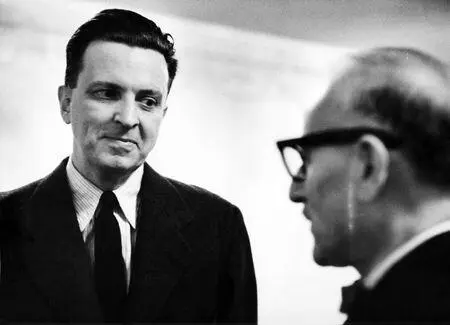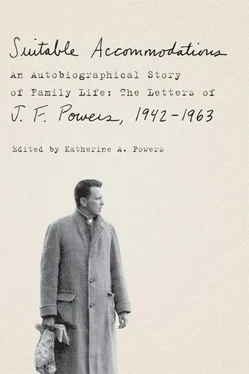Jim
27. As a winner, let me say you can’t win, not on this course, October 23, 1962–August 29, 1963

Jim and Leon Edel, National Book Award ceremony, 1963
The novel was badly handled by Doubleday. The text was rife with misprints, and breaks in the narrative were not indicated. Bookstores didn’t get the number of copies they ordered, and in the coming months the book kept going out of stock. Jim’s letters to Ken McCormick, his editor at Doubleday, became increasingly bitter: “If you weren’t out of stock on publication day, you were so close it must have gladdened the hearts of the men who worry about the high cost of warehousing … I pray that my book isn’t out of stock for periods between now and Christmas, as it’s a long, long time between Christmases.” (It was, in fact, unavailable in places for periods before Christmas.) Beyond that, Doubleday’s advertising department was too late in getting ad copy to many of the journals in which the book was to be publicized and bungled the wording of Evelyn Waugh’s expression of admiration.
Journal, October 23, 1962
After yesterday’s incredible news of a blockade on Cuba, I don’t know what to think about the future, already depressing enough.
CHARLES SHATTUCK
412 First Avenue South
St Cloud, Minnesota
November 6, 1962
Dear Chuck,
Good to hear from you, to see that you still can’t type, are safely back in captivity, and to know that you do like the book. I wish you might’ve read it in manuscript, but otherwise I have no regrets, which is rather surprising: it is as if I’ve been packing a bag to catch a train and actually got everything in. Well, I did wish I’d made Dr Fish Dr Jass (the name on the door in the old offices of the Clems), but for reasons only an old musician might appreciate and small ones at that. (Perhaps you know the old tune “Dr Jazz,” where the man calls out, “Hello, Central, give me Dr Jazz!”)
I gather the book doesn’t come off to the extent I hoped it would, for you and others, and whether this is actually the case, due to the fact that you’ve read parts as stories (as you say), to the fact that I am not a novelist, or, what I sometimes think is the same thing, lack patience, or have an 18th-century mind, or no mind at all, I don’t know. I had hoped — and had some reason to hope, going by first reports, not only from Betty and friends, but from booksellers — that the book would be a bestseller, and perhaps it will be, over a twenty-year period, but so far it hasn’t made its move. In six weeks, it has sold about 12,000 copies (that is the total sale, rather, for there was a pretty good advance sale). This is more important to me than in the past, since this is a novel — it is the novel I was assured would make all the difference in the world — and not another collection of stories, and I do not think I’ll do better. If I can’t make it with this one, I’ll have to give up the idea I’ve lived with and on so many years — short-story writer, no, novelist, yes, economically speaking. The book was published last Thursday in England, and I’m hoping it will be less of a puzzle there. […] Best to you both and to others there.
Jim
Journal, November 7, 1962
Scotty (the typewriter man) brought back my typewriter almost completely refurbished and would take nothing. I was thinking a while ago what, in a very few words, my trouble has always been and still is: a desire to associate excellence with eminence. This is the rub that keeps me thinking (in my fashion) and writing.
Birdie Strobel, Betty’s aunt, died on November 16, 1962.
Morte D’Urban continued to be plagued by what Jim considered Doubleday’s incompetence, most especially its small print runs and failure to supply enough books to stores during the gift-buying season. He was also disappointed by the reading public’s lack of enthusiasm for the novel. By December 11, 1962, it had sold 13,864 copies, half of what Jim had hoped for and, indeed, expected. His journal makes melancholy reading, as do his letters to his editor at Doubleday, Ken McCormick: “What am I doing you ask, and the answer is suffering. I have written (and sold to The New Yorker , fortunately) a fine long story,1 but mostly I have been sweating it out, watching my hopes for the future disintegrate.”
Journal, December 14, 1962
Both bookstores in town are out of stock on my book and awaiting more copies — but I doubt they’ll arrive before Xmas … Al [Strobel] left for Idaho today,2 for Christmas. Who would have thought this the last time I drove him to the train?
JACK CONROY
412 First Avenue South
St Cloud, Minnesota
December 18, 1962
Dear Jack,
Let this be my Xmas letter and card to you (I do not plan to purchase any of the latter this year). […] The book is still alive, Jack, and just might come on stronger, but as of now I have to call it a flop — by my expectations and perhaps even by Doubleday’s. I am pretty well disorganized in my mind as to my future, whether ’tis better to be a novelist or a short-story writer, for in my case there really isn’t a great difference in the payoff, unless, of course, the novel is going to put on the longest come-from-behind stretch run in history. Whether we stick it out here, or I take a job teaching, or we go abroad again — this depends on the book’s sale. […]
You will not send me a copy of The Disinherited , Jack.3 I’ll buy one — and that is that. If you send me one, I’ll return it to you autographed. That is the form failure has taken in my case, Jack. I autograph every book I can lay hands on, this to compensate for the great success I might have had, and am now watched when I enter the public library here. All the textbooks my daughters bring home from school I’ve autographed. Ever hear of a case like this, Jack?… Yes, I heard from Herman Kogan,4 who asked me to do a short piece for the book page, and I said I might — and thought I just might a month ago — but I am miles away from such thoughts now. I am only interested in writing my name these days. That is all, Jack.
J. F. Powers
J. F. Powers
J. F. Powers
Al Strobel died on January 22, 1963, only a couple of months after the death of his wife. The Powers family had to vacate the house they had been living in for over three years.
HARVEY EGAN
January 24, 1963
Dear Fr Egan,
[…] Al Strobel died Tuesday evening, in bed, from a heart attack. Bertie, I think I told you, his wife, died in November. This is a knockout blow, their deaths, the end of something. The children — wife of dentist, a physician, an optician, and a newspaperman — are on the scene now. The funeral is tomorrow. Al was a very good and gentle man. He grew flowers, had nails and screws of all sizes, and never got excited. The children, though he didn’t work at winning them over, loved him. I used to think of him as a typical small-town businessman, really only the husband to Bertie, but for several years I have known better and have respected him. He is someone I hope to see again. I was the last one to see him alive and, fifteen minutes later, the first one to see him dead. I shouldn’t be telling you this, I know, but that is what’s on my mind. No news otherwise.
Jim
Jim, filled with gloom about Morte D’Urban ’s prospects, wondered how to make a living. One moment he would resolve to take the next good teaching job offered him; the next he would turn down just such an offer.
Читать дальше













